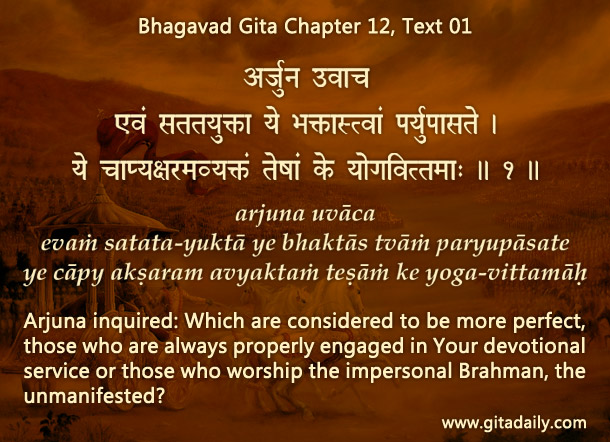After the revelation of the universal form in the Bhagavad-gita’s eleventh chapter, Arjuna’s question at the start of the twelfth chapter seems like a non sequitur: “Which is better: worshiping Krishna as the personal absolute or worshiping the impersonal absolute?” (12.01).
Just a few minutes earlier (about twenty-five verses earlier), the sight of the scary kala-rupa (Krishna’s form as time) had alarmed Arjuna (11.24-31). How did he recover so quickly to ask such a deep and seemingly unrelated philosophical question? His shift of gears is as remarkable as the change of TV channels by a person, when they nonchalantly shift from a bone-chilling horror movie to an intellectually demanding Discovery channel episode.
While the themes of the universal form and the impersonal manifestation are distinct, Krishna’s underlying approach to both of them is similar. He consistently emphasizes that the Divine who reciprocates love is far more special than other divine manifestations, including awe-inspiring ones. Just as the sight of the universal form might inspire awe, so might the concept of an all-pervading impersonal absolute. On hearing from Krishna that God as an attractive person who reciprocates love is far more special than God’s form that encompasses the universe (11.52), Arjuna wonders whether the same might apply to God’s impersonal manifestation which too permeates all of existence.
Krishna answers in the affirmative by declaring that those who love him are more intimately united with him than those who worship the impersonal absolute (12.02). Elaborating through contrast, Krishna states that worshiping the impersonal absolute is difficult (12.05), whereas he personally delivers those who love him (12.06-07).
One-sentence summary:
A personal God who reciprocates love is far more special than a God who spans the cosmos, be it by encompassing it as the universal form or by permeating it as an impersonal substrate.
Think it over:
- What is unusual about Arjuna’s question at the start of the Gita’s twelfth chapter?
- What links the disparate themes of the Gita’s eleventh and twelfth chapters?
- How does Krishna stress divine reciprocity in these two chapters?
***
12.01: Arjuna inquired: Which are considered to be more perfect, those who are always properly engaged in Your devotional service or those who worship the impersonal Brahman, the unmanifested?
To know more about this verse, please click on the image


Leave A Comment